By Albert Oppong-Ansah, GNA
Accra, Oct. 2, GNA – Stephen (not his real name) is a security officer with one of the utility companies in Accra. He grieves that his days are certainly numbered.
Understandably, a robber can terminate his life any day. But that is not the source of his anguish, it is the very air he breathes to keep his job.
With every breath, he takes in a toxic cocktail of pollutants from the dark plume of smoke released from the everlasting open burning activities near his duty post.
The hellish smoke is from a parcel of land in the heart of Bubuashie and Darkuman communities in the Okaikwei South sub-metro of the Greater Accra Region.
The land, larger than five of Accra’s standard football fields, hosts all kinds of dangerous burning activities. It is also home for waste collectors, mechanics and cattle herdsmen.
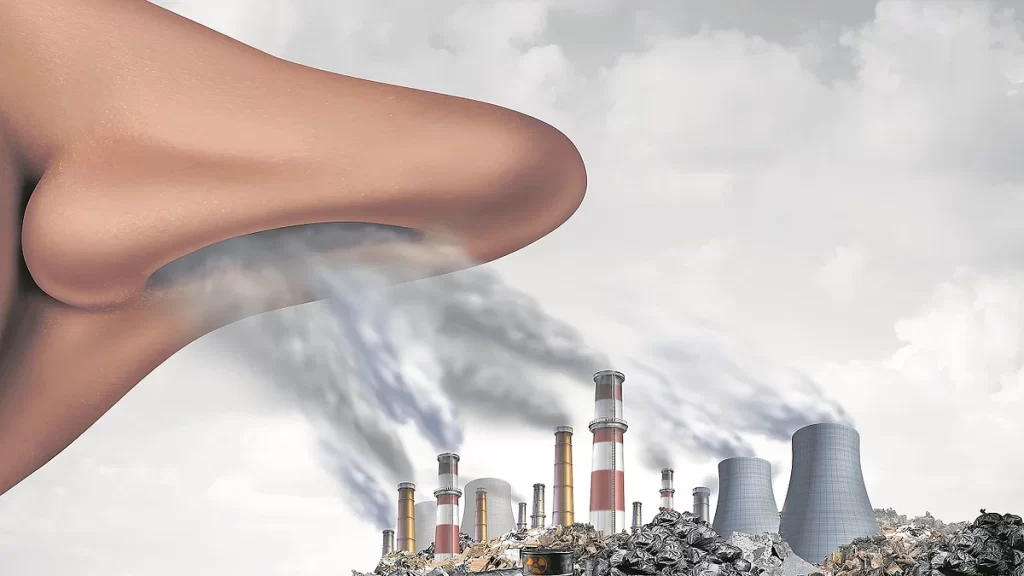
Electrical and electronic parts, all kinds of plastic materials, fabrics, wood and anything combustible is welcomed into the fires at the park. Thus, a ready source for scrap dealers to source metals, such as copper, to sell.
Chemicals including dioxins, furan, sulfur dioxide, nitrogen are released during open burning of wires and plastics, as well as during acid leaching, shredding, and other dismantling processes, according to the Centers for Disease Control and Prevention.
Stephen has physical signs showing his predicament – His sclera (white part of the eye) appears dark, his breath is short, his eyes never stop itching and his cold is chronic.
Mentally, he says he’s always anxious, but he just can’t walk away from the job that feeds him and his family.
Indeed, his office building is also not spared as its original white and blue paint is now covered by expansive layers of varied shades of soot; just like that of many buildings in that neighborhood.
“This is troubling for my health. My superior knows about the situation and has complained to the powers that be, but we can’t see any action as we’re forced to breathe to our death,” he tells the Ghana News Agency (GNA).
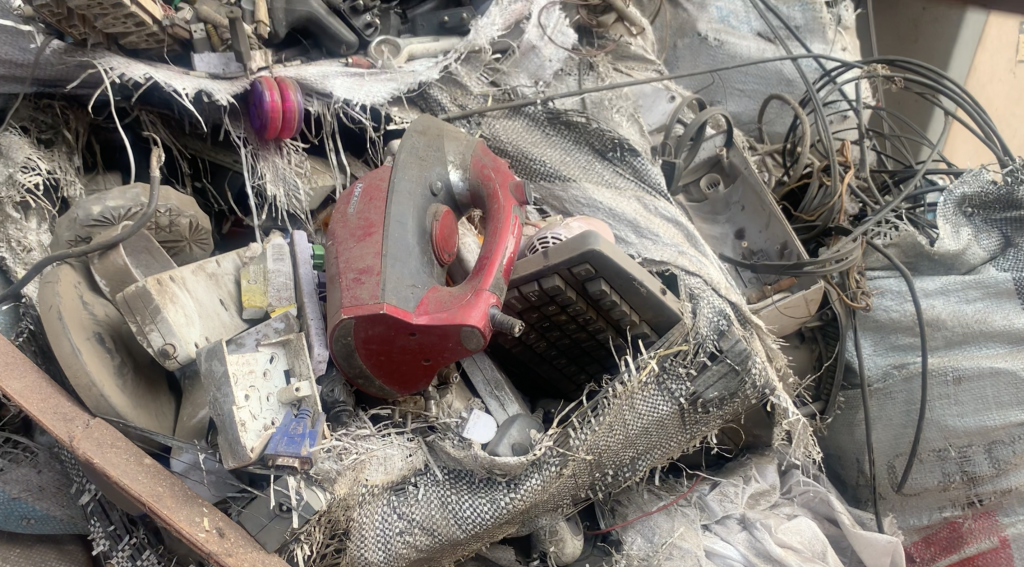
Madam Comfort Anda, a widow who lives about 20 meters from Stephen’s job station, says she cannot wait to vacate the area as her rooms are filled at night with smoke that kills slowly.
“I earn GHS 20 a day (USD1.9) and spend 70 per cent of it on buying cold-related medication for the four of us… It could have been more but for the National Health Insurance Scheme,” the mother of three tells the GNA, amid sighs.
A number of residents interviewed share common concerns. However, many say they are unable to publicly protest for fear of becoming assault targets of the culprits.
Nearly 97 per cent of the process of managing electronic waste in Ghana is done informally, resulting in the release of pollutants to contaminate soil, air and groundwater, Dr Vincent Nartey Kyere, an E-waste Expert at the Ministry of Environment, Science, Technology and Innovation, notes.
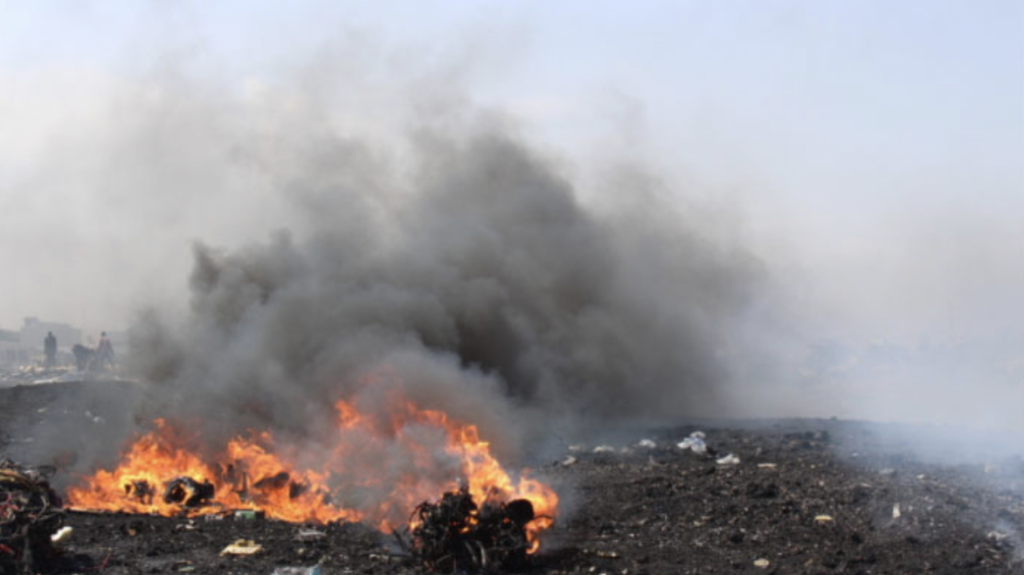
The burden of health and economic costs on Stephen, Comfort and their compatriots in suffering, is just a representation of the silent air pollution crisis in many Ghanaian communities. Many innocent people are inhaling the toxic air that is released from the stroke of a lighter that raze through different waste materials.
Mr Mohamed Mooda, the Chairman of Darkuman Neighbourhood Committee, is also alive to the crisis that many residents, especially head potters (kayayei), who sleep in the open spaces are exposed to.
“The level of education of residents is low and they do not understand the impact of breathing toxic air. They often do not seek medical care until their health condition becomes severe. They resort to self-treatment by buying drugs from chemical shops around,” he narrates.
Dr Raphael S. Tufuor, of the Faith Clinic tells the GNA that Stephen’s feelings about breathing to his last is legitimate.
“The continuous exposure to the polluted air of that magnitude is likely to affect all the organs, especially compromising the lung functions,” he explains.
His clinic, which is located about 300 meters from Cable and Wireless, attends to an average of about 50 patients with respiratory diseases every week.
“There is no day I do not receive patients with respiratory tract conditions. Sometimes they come in not with respiratory distress, but further investigation shows that their condition is caused by the bad air,” Dr Tufuor says.
For him, the health burden on patients is ‘biting’ because aside from the consultation fee, which is paid for by the National Health Insurance Authority, x-rays and other care services are funded by the individual.
“Sometimes, when we admit them and they realise that they cannot foot the bills they abscond when their condition becomes stable.”
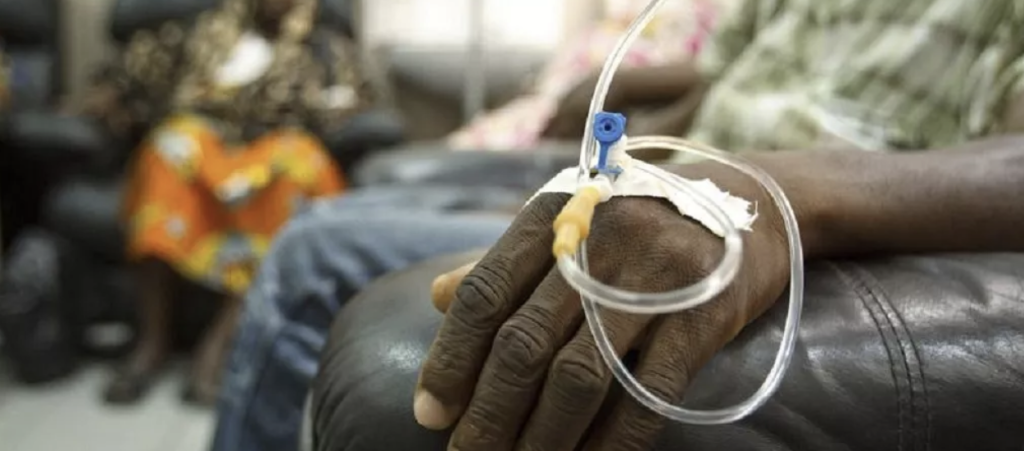
Going by the unconfirmed figures from the hospital, about 1,000 patients in just a month show up at that health facility with respiratory tract conditions.
The number of cases from Dr Tufour reflects the data obtained by the GNA that the country’s insurance scheme spends US$14,976,000 annually on the treatment of conditions like ischaemic heart disease, chronic obstructive pulmonary disease, and pneumonia for some 500 hospitalised patients.
Many have been diagnosed with medical short-medium-and-long term diseases, including stroke, chronic obstructive pulmonary disease, trachea, bronchus and lung cancers, aggravated asthma and lower respiratory infections.
Statistics from the Ghana Health Service (GHS) for the first half of 2023 show that asthma, a condition mostly caused by poor air quality, is the second most non-communicable disease (NCDs) recorded.
Dr Efua Commeh, the Acting Programme Manager for Non-Communicable Diseases, GHS, explains that the data means more people are getting sick with chronic obstructive pulmonary diseases, such as asthma.
One of the biggest environmental problems the world faces today is outdoor air pollution, with open burning being one of the causes, says Earth Org, a development oriented-organisation that champions a healthy, happy and thriving planet.
Not only that but more than 28,000 people die in Ghana from exposure to air pollution every year (WHO 2020). This number is projected to increase if no action is taken to tackle the issue.
Globally WHO estimates that 4.2 to 7 million people die from air pollution every year and that nine out of 10 people breathe air containing high levels of pollutants.
In Africa, 258,000 people died as a result of outdoor air pollution in 2017, up from 164,000 in 1990, according to UNICEF.
Open burning by either individuals or unauthorised groups in Ghana is against the Public Health Act 2021 (ACT 851), the Local Governance Act, 2016 (ACT 936) and the Accra Metropolitan Assembly (AMA) bye-law (2017).
Under the 2017 Sanitation bye-law of the AMA for instance, a person commits an offence when found to be engaging in open burning and likely to pay a penalty of not less than 100 penalty units (not less than GHS 1,000/USD 100) when found guilty and not more than 150 penalty units, or sentenced to prison between three to six months or both.
Twenty-five-year-old Abdul Guma, uses open air burning to retrieve precious metals to sell. He knows that his illegal activity is harming others. However, he blames his action on the lack of the proper tools to get the metals.
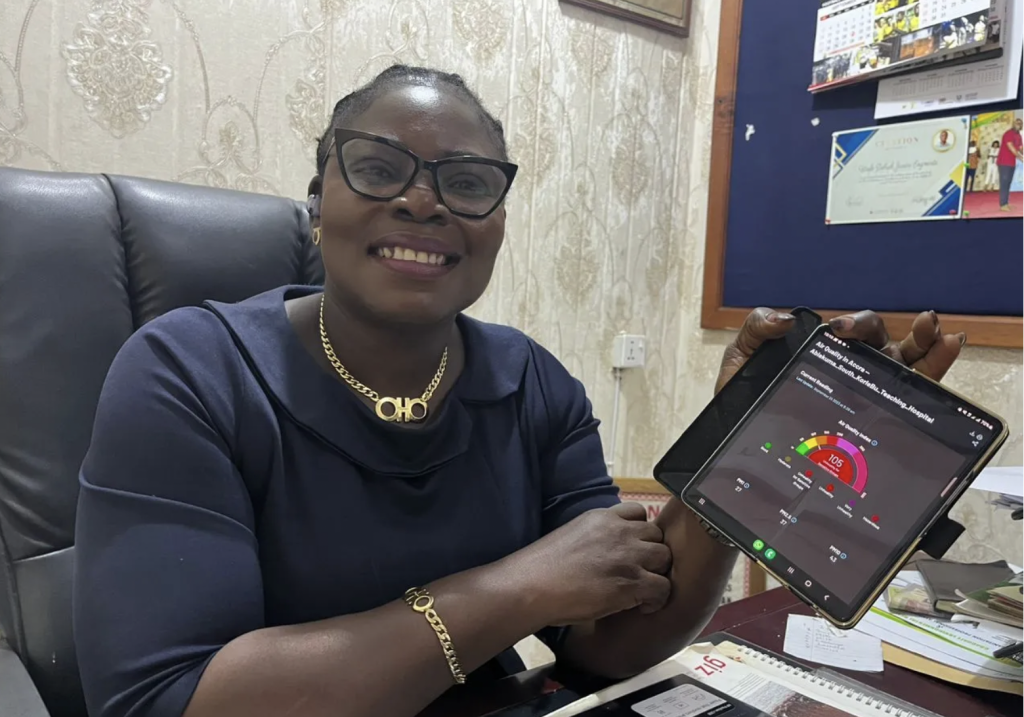
Madam Florence S. Kuukyi, the Director, Metro Public Health Department, AMA, tells the GNA that although there is no air quality sensor at Cable and Wireless the activities pollute the air, making the quality of air poor.
She says officers have visited the place to serve perpetuators with several abatement notices.
“So far, the activities still go on and nothing has changed. We have applied for summons from the sanitation court. Upon receipt, the offenders will be served, arrest effected and processed for court,” she assures.
The most vulnerable in society are the most exposed to air pollution and offer them limited or no choice, Mr Desmond Appiah, the Country Lead of the Clean Air Fund.
Access to clean air is a fundamental human right of everyone, hence, anything short of that becomes an abuse of rights, says Mr Solomon Oppong, a Human Rights activist.
Solomon, who is also an opinion leader, accuses state institutions, including the AMA, for reneging on their responsibilities and allowing an illegality to fester that long.
The AMA says it is working towards ending open burning in its jurisdiction, but the signs are not clear when that will happen.
Unfortunately for Stephen, he can only continue to count the bad days to his final breath or to the release of fresh air to his lungs in fulfillment to the city authorities’ promise.
GNA
…This story was a collaboration with New Narratives. Funding was provided by the Clean Air Fund. The funder had no say in the story’s content…